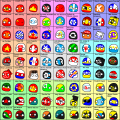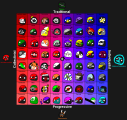 |
Stub Article "Help" - Still-Being-Drawnism This page is a stub. You can help FreePCB by expanding it. |
Situationism is an economically left and very libertarian ideology and philosophical movement that believes in an anti-authoritarian interpretation of ![]() Marxism, in fusion with the avant-garde art movement. He believes that the Media, or as he would call it "the spectacle", is the manifestation of commodity fetishism rampant in today's society.
Marxism, in fusion with the avant-garde art movement. He believes that the Media, or as he would call it "the spectacle", is the manifestation of commodity fetishism rampant in today's society.
History
In the late 1950s, concurrently and geographically parallel to cultural movements in the US such as the "Beatniks", there was a constellation of European artists and political theorists who were fans of Marxism and Surrealism. Situationist International was initially founded in 1957 as a way for artists and revolutionaries to talk together about how surrealism is ideological, they concluded they should go out in the streets interacting with random people in surreal ways, in order to evangelize their culturally-liberated sensibility to others. This, they believed, would wake people up slowly, one by one, from the fever dream of their consumerist conformity. Hence, by creating interesting social situations, they hoped to promulgate more mental freedom and social/class consciousness.
In the 1960s, concurrent to exponential critical mass in social movements in the US, the Situationist Movement was considered a mass inspiration for youth protests in the May 1968 Paris general strike, which the de Gaulle government had characterized as an insurrection. The SI organization by then was not focused on artistic innovation, instead supporting artistic energy as applied to a culturally transformative youth movement, and achieving the political goal of social transformation.
Foundations and Beliefs
Alienating Capitalist Spectacle
Situationists philosophized about post-war modernity from a framework that Marx got it right with class but missed a few things, and assert that capitalism is beyond just materially vicious, but also philosophically insidious. It has sown alienation, commodification, and isolation of community in favor of fetishized corporate brands and a conception that excessive spending on consumption will bring the cure to that isolation. Their solution was to subvert the culture by sowing the seeds of what may be arguably called prototypical Post-Modernism.
The two seminal books to come out of the movement were Debord's Society of Spectacle and Raoul Vaneigem's book, translated literally as "Treatise on Manners for a Younger Generation". Debord's book was written as a set of aphorisms, a subversion of the Tao Te Ching that critiqued capitalism's emphasis on spectacle as replacing representation with reality and essentially gutting the cultural fabric that was the working classes' last respite. Whereas Vaneigem's book, possibly sarcastically titled, takes a more pro-active critique of how people fail to truly communicate with each other, encouraging the youth to engage in being more socially open.
Random Walks
The Chilean Poet society that Alejandro Jodorowsky was involved in, documented in his film Poesia sin Fin, is a roughly contemporaneous example of Situationism. The protagonist and his poet friend decide to begin walking in a straight line no matter what and encounter a series of home owners as they march through doors, climb through windows, amble over public barriers and so on, which causes a variety of fun social interactions and blurs property boundaries. However these Chileans do not qualify as Situationists as they are not French, thus they are merely Sparkling Surrealists.
Personality and Behavior
Situationism is *fun*. Then, maybe Situationism is a bit too heavy. Situationism likes to get dense on theory as a flex. Situationism is almost what you'd get if you took Egoist and made him more of an artist, and dramatically more passionate about community, combined with unorthodox Marxism. Situationism is prone to random utterances of a cryptic nature, including riddles, samplings of poetry, lytotes, satire and sarcasm. Situationism likes to take long walks through private property, and when told "excuse me, this is private property," Situationism might respond with quips such as: "What isn't?", "Super Profundo on the early eve of your day" or "Can a rabbit own property?" followed by simulated rabbit noises.
Getting oneself arrested can at times be a... situational hazard... for a Situationist.
How to Draw

Drawing Situationism is very easy:
- Draw a ball
- Divide it in half diagonally, from bottom left to top right
- Colour the top left half red
- Colour the bottom right half teal
- Draw the eyes
You're done!
| Color Name | HEX | RGB | |
|---|---|---|---|
| Red | #FF0000 | 255, 0, 0 | |
| Teal | #016965 | 1, 105, 101 | |
Stylistic Notes
Situationism loves avant-garde art and wordy jargon. He also tries his best to get ![]() Marxism and
Marxism and ![]() Anarchism back together whenever they are near each other.
Anarchism back together whenever they are near each other.
Relationships
Friends
 Council Communism - The only true road to working class emancipation.
Council Communism - The only true road to working class emancipation. Satirism - While you do little to find remedies to issues, your masterful execution of détournement is vital to our cause
Satirism - While you do little to find remedies to issues, your masterful execution of détournement is vital to our cause Marxism - You came up with an excellent means of dissecting human constructs, it would be stupid of us to not continue your analysis
Marxism - You came up with an excellent means of dissecting human constructs, it would be stupid of us to not continue your analysis Hegel - Possibly even better than Marx. Immanent critique is the greatest contribution to systematic philosophy the world might ever know
Hegel - Possibly even better than Marx. Immanent critique is the greatest contribution to systematic philosophy the world might ever know
Frenemies
 Left Communism - You influenced me in some points, but you're basically
Left Communism - You influenced me in some points, but you're basically  Council Communism without the cool.
Council Communism without the cool.- Template:Ancom - A great one! But disrespect for
 Marxism is intolerable.
Marxism is intolerable.  Every Accelerationist - So similar, yet you drown in the spectacle's politics.
Every Accelerationist - So similar, yet you drown in the spectacle's politics.
Enemies
 Futurism - You want the aestheticization of politics, but I will politicize the arts!
Futurism - You want the aestheticization of politics, but I will politicize the arts! Mediacracy - The spectacle that I wish to shatter.
Mediacracy - The spectacle that I wish to shatter. Capitalism - The one who wishes to uphold the spectacle.
Capitalism - The one who wishes to uphold the spectacle. Fordism - Ok, this is my worst nightmare.
Fordism - Ok, this is my worst nightmare.
Further Information
Books
- Society of the Spectacle by Guy Debord
- The Revolution of Everyday Life by Raoul Vaneigem
- The Right To Be Greedy by For Ourselves
PDF material
Wikipedia
Gallery
-
Credit:
 TheLegend2T, Source
TheLegend2T, Source
-
Credit:
 TheLegend2T, Source
TheLegend2T, Source
-
Template:Libleft Template:Anarchist
<comments />


